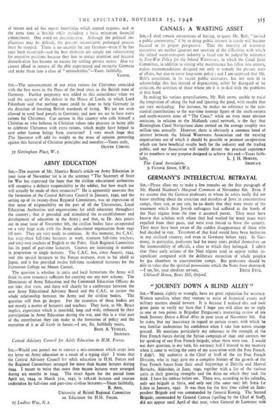ARMY EDUCATION
SIR,—The marrow of Mr. Maurice Bruce's article on Army Education in your issue of November 1st is in the sentence "The Secretary of State for War has expressed the hope that the civilian educational authorities will recognise a definite responsibility to the soldier, but how much use will actually be made of their resources?" He is apparently unaware that the formation of the Central Advisory Council in January, 1940, and the setting up of its twenty-three Regional Committees, was an expression of that sense of responsibility on the part of all the Universities, Local Education Authorities and organisations for adult education throughout the country ; that it preceded and stimulated the re-establishment and development of education in the Army ; and that, as Dr. Aris points out in your issue of November 8th, the civilian bodies have co-operated on a very large scale with the Army educational organisation from 1940 till now. They are very ready to continue. At this moment, the C.A.C. has sixty-three full-time lecturers at work, nineteen full-time teachers, and sixty-two teachers of English to the Poles. Each Regional Committee has its panel of part-time lecturers. Courses are increasing in number in proportion to single lectures. The C.A.C. has, since August, 1944, sent 26o special lecturers to the Forces overseas, even as far afield as Japan, and it has provided twelve full-time residential lecturers for the Formation College on Mount Carmel.
The question is whether in units and local formations the Army will think its own resources sufficient for carrying out any new scheme. The Directorate of Army Education and the Command Education Officers do not take that view, and there will shortly be a conference between the new Army Educational Advisory Board and the C.A.C. to review the whole relationship between the Army and the civilian bodies. The question will then go deeper. For the resources of these bodies are not merely a matter of lecturers and teachers. They have, as Mr. Bruce implies, experience which is manifold, long and wide, enhanced by their participation in Army Education during the war, and this is a vital part of the contribution they can make to the formation of policy and the execution of it at all levels in future.—I am, Sir, faithfully yours, BASIL A. YEAXLEE, Secretary.
Central Advisory Council for Adult Education in H.M. Forces.


































 Previous page
Previous page